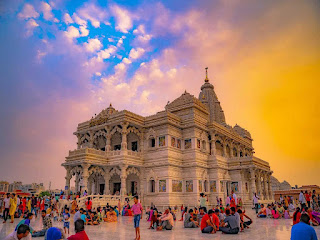Exploring the Divine Charm of Vrindavan Temple: A Spiritual Journey
North Indian
state of Uttar Pradesh has the holy city of Vrindavan. It is supposed that here
is where the Hindu god Krishna spent his formative years. Many of its temples
are devoted to the god Krishna and his goddess spouse Radha. Every few minutes,
the curtain in front of the figure of Krishna is opened and closed at the Banke
Bihari Temple. In the Radha Raman Temple, Radha is represented with a gold
plate next to Krishna. A huge white marble temple called Prem Mandir.
Vrindavan, a holy town in the Indian state of Uttar Pradesh's Mathura region, is well-known for its extensive spiritual history and religious significance. It is mostly connected to Lord Krishna, and it is thought that here is where he spent his infancy and engaged in heavenly pastimes. The Vrindavan Temple, a site of prayer and devotion that draws millions of pilgrims and visitors from all over the world, is located in the centre of this sacred town. With a focus on the Vrindavan Temple's history, architectural elements, religious importance, and the spiritual experience it delivers to its guests, this page tries to provide a thorough analysis of the temple.
Historical Background
Hindu
mythology and history attach great importance to the Vrindavan Temple. The
Vallabhacharya sect of the Vaishnavite tradition is thought to have built it in
the sixteenth century. The temple was constructed as a monument to Lord Krishna
and Radha, his unending love. The temple has undergone alterations and
additions throughout the years, evolving into a masterwork of architecture that
showcases the skilled workmanship of the time.
Architectural Splendor
The
Vrindavan Temple is a remarkable example of a fusion of architectural styles,
with a focus on North Indian temple design. The temple complex consists of
several buildings, each of which adds to its magnificence. The main temple has
a spire that rises far into the sky and is covered in beautiful carvings and
sculptures. Exquisite patterns that reflect incidents from Hindu mythology,
notably the story of Lord Krishna, are used to decorate the walls and pillars.
The major
deity of Lord Krishna and Radha is kept in the garbha griha, the temple's
sanctum sanctorum. The idols are exquisitely dressed and ornamented, and they
give off a celestial atmosphere that mesmerises worshippers. Smaller shrines to
different gods, including Lord Rama, Lord Shiva, and Lord Hanuman, among
others, are also part of the temple complex.
Religious Significance
For
Vaishnavite believers, particularly devotees of Lord Krishna, the Vrindavan
Temple has great devotional significance. The temple is a popular destination
for pilgrims, attracting followers looking for enlightenment and a closer
relationship with God. It is thought that making pilgrimages to temples and
praying there might result in blessings, enlightenment, and the fulfilment of
one's goals.
The Raslila,
a celestial dance performed by Lord Krishna and his beloved Radha and Gopis
(cowherd maidens), is particularly well-known for its connection to the temple.
When the Raslila is performed during celebrations like Janmashtami and Holi,
worshippers go to see this entrancing dance recreated and to experience
Radha-Krishna's holy love.
Rituals and Festivals
Religious
rituals and exuberant festivals take place at the Vrindavan Temple. Daily rites
like as Bhog (food offering) and Aarti (ceremonial worship with lights) are
carried out with the utmost dedication. When performing these rites, devotees
join together and sing bhajans (religious songs) in adoration of Lord Krishna.
The biggest
festival held at the temple each year, Janmashtami, which honours the birth of
Lord Krishna, is also one of the others. During this occasion, the entire town
of Vrindavan comes to life with enthusiasm and excitement, drawing a large
number of devotees who participate in religious activities, processions, and
cultural events. Given that Vrindavan has a unique place in the hearts of
Hindus, the holiday of Holi is also celebrated there with tremendous fervour.






.jpg)
This blog is outstandingly well-written and really informative for everyone.
ReplyDelete